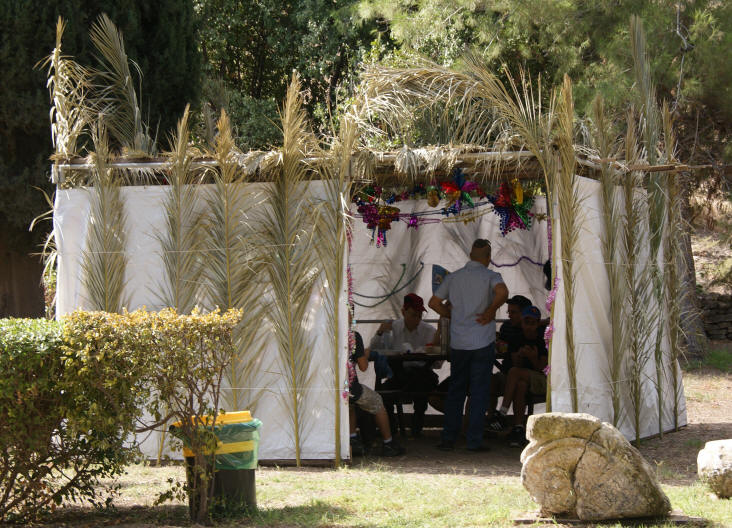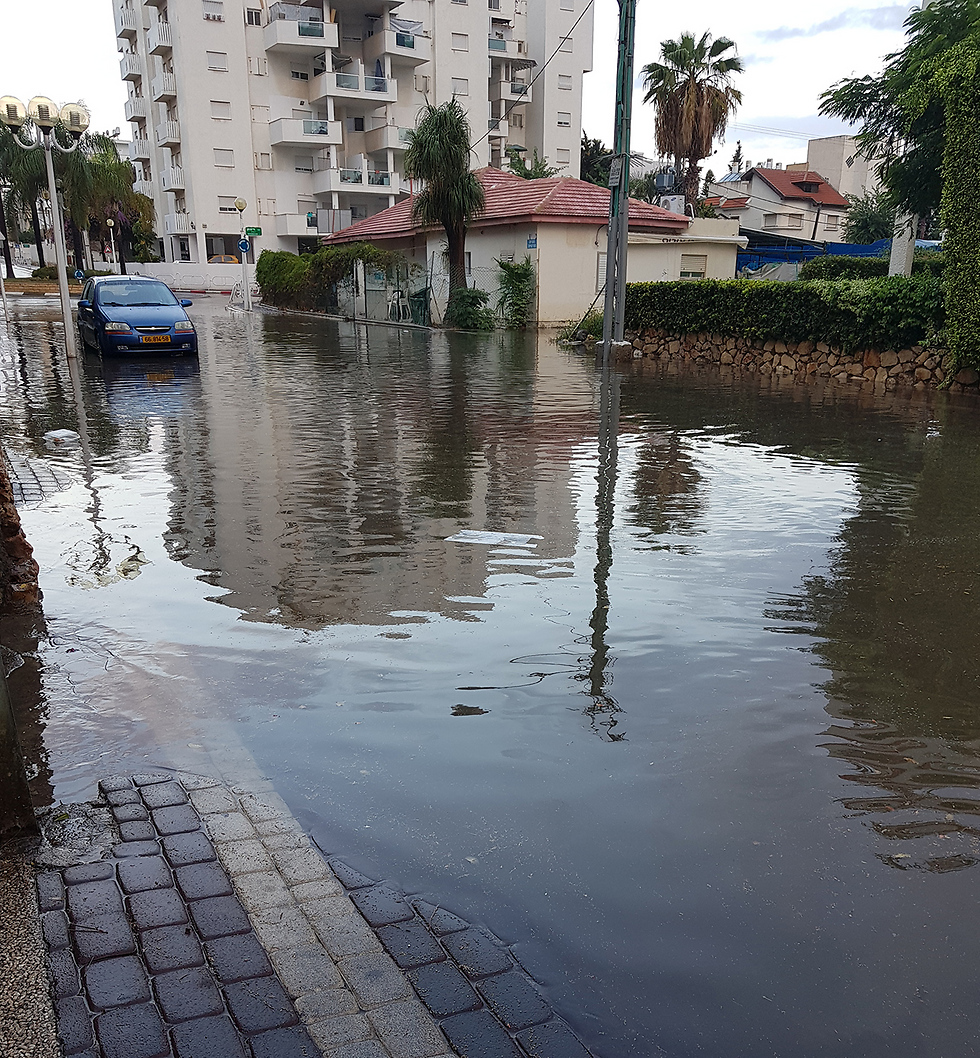THE YOREH
The Yoreh (pronounced yor-ay) is the Hebrew word for the Early Rain, or the first rain of the winter rainy season. On Thursday night the eagerly-awaited Yoreh arrived here in Israel. After 6-8 months during which no rain falls in Israel, all its inhabitants, human, animal and plant, long for the thirst-quenching, cleansing rain. In an earlier, less sophisticated time, Israelis used to go out in the streets and dance for joy when the Yoreh arrived. Today I didn't dance but instead I took a walk in the forest and rejoiced in breathing the freshly scrubbed air, the blue, truly blue sky, and the green, really green trees. I don't know if trees have feelings but if they did, I can imagine how happy they would be to have all the dust washed from their leaves and fresh rainwater to drink.
 |
| From Har Hauniversita - my forest walk today |
The Yoreh also breaks the back of the summer heat. In Israel there are really only two seasons, the 6-8 month long summer and the short winter rainy season. I have lived nearly 40 years in Israel and every year I am still amazed afresh by how the seasons can switch in just a day, especially when the Yoreh comes. On Thursday the temperature here was still around 30 degrees Celsius but on Friday it was only 13 degrees. It won't stay that cool of course, and we will still get some very hot days, but the main heat of summer is now broken and from this point it will grow cooler and cooler.
In the Bible, the timely arrival of the Yoreh and the Malkosh (the latter or spring rains) is linked with the blessing of God. We see it first spoken of in the Book of Deuteronomy where it is described as the provision given by God, for agricultural abundance in the Promised Land, conditional upon the keeping of his commandments by the people of Israel,
‘And it shall be that if you earnestly obey My commandments which I command you today, to love the Lord your God and serve Him with all your heart and with all your soul, 14 then I will give you the rain for your land in its season, the early rain and the latter rain, that you may gather in your grain, your new wine, and your oil. 15 And I will send grass in your fields for your livestock, that you may eat and be filled.’
Deuteronomy 11: 13-15
The prophet Joel also spoke of the early (or former) and latter rains, saying
Be glad then, you children of Zion,And rejoice in the Lord your God;For He has given you the former rain faithfully,And He will cause the rain to come down for you—The former rain,And the latter rain in the first month.
Joel 2:23
This passage is difficult to translate and interpret for in Hebrew the word here translated in the version quoted (NKJV), as former rain is not 'yoreh' but 'moreh' in Hebrew. 'Moreh' comes from the same root but in this form it actually means 'teacher' and it could be translated as " for He has given you the teacher of (or for) righteousness, and he will cause the rain to come down for you, the teacher and the latter rain in the first month ". Some see this as speaking prophetically of the coming of the Messiah, the Teacher of Righteousness" at the time of the latter rain or Malkosh. The coming of the Yoreh is a time of blessing but it can also be a time of danger. The first rains can be very heavy and the ground, baked like concrete over the summer, is impermeable leading to rapid runoff and often flooding, especially in the mountain and desert areas. On Thursday a 4-year-old Bedouin boy was swept away and drowned by a flash flood near Arad in the Negev, and 9 hikers had to be rescued when floods cut them off. On the other side of the Dead Sea, in Jordan, some 44 people, mostly middle school children on a school trip, were swept away by a flash flood. The death toll stands at 18 but this may yet rise as some are still missing. Jordan called upon Israel to help and our elite military rescue unit flew in and helped with the search during the night.
In the South, in and around the Gaza Strip, there has also been a different kind of rain this weekend. The word 'Yoreh' has a second meaning in Hebrew, namely the verb 'to shoot'. The southern Israeli towns around the Strip were hit with 34 rockets over the last 24 hours, and the IDF responded by striking some 87 Hamas and 8 Islamic Jihad military targets in the Gaza Strip, including the building used by Hamas as its Security Headquarters. In this volley of rockets, seven Israelis were lightly injured, mostly suffering from shock. There has been no rocket fire from Gaza now for about 8 hours but we are still on high alert and residents in the south are under Rear Command orders to remain close to their bomb shelters.
Yesterday, Friday, there were reports that Israel and Hamas had with the help of Egyptian intervention reached a ceasefire agreement. As part of this agreement Hamas had undertaken to stop the weekly border protests and the incendiary attacks completely in return for the reopening of the border crossings and other concessions by Israel. In spite of these reports, some 16,000 'demonstrators' gathered at the border fence yesterday, burning tires, throwing grenades, Molotov cocktails and rocks at IDF positions, attempting to break through the border fence and releasing incendiary balloons. As a result, 3 Palestinians were killed as Israeli troops fired on them. Two others were killed during riots in the West Bank.
Islamic Jihad is saying that last night's rocket attacks were in retaliation for these deaths. If this represents a new policy on both sides then the situation is bound to continue to escalate over the coming weeks. Here in Israel there is growing anger and frustration about the situation, especially amongst residents of the south. It seems clear that life in the south is becoming intolerable that this situation cannot continue much longer, but the alternative, all-out war against Hamas and Islamic Jihad, also seems unthinkable. Such a war would cause many casualties and much suffering on both sides of the fence, and it is unclear what would be the end result. Would it trigger a wider conflict involving Hezbollah, Syria and Iran? Even if that did not happen and Israel conquers Gaza again, there is no way we want to occupy the Strip or have the responsibility of ruling the population there.
As I write news is coming in of another incident of 'yoreh' (shooting), this time in a synagogue in Pittsburgh, USA. The shooter (yoreh) shouted 'All the Jews must die' as he opened fire in the synagogue during Shabbat prayers, killing 11 people, including 3 police responders, and injuring many others.
I am reminded of the passage in Jeremiah 16 which speaks of the time when God will send hunters to hunt out the children of Israel and cause them to flee to the Land.
"Therefore behold, the days are coming,” says the Lord, “that it shall no more be said, ‘The Lord lives who brought up the children of Israel from the land of Egypt,’ but, ‘The Lord lives who brought up the children of Israel from the land of the north and from all the lands where He had driven them.’ For I will bring them back into their land which I gave to their fathers. “Behold, I will send for many fishermen,” says the Lord, “and they shall fish them; and afterward I will send for many hunters, and they shall hunt them from every mountain and every hill, and out of the holes of the rocks.
Jeremiah 16: 14-16
In recent years we have seen an upsurge in immigration, especially from the USA and Europe, motivated by fear of the increasing AntiSemitism worldwide. In former years many 'fishermen' went out around the world to convince Jews to return to the Land and many responded, but many did not, especially those Jews living comfortably in the Americas and Europe. With the rise of AntiSemitism and the 'hunters' becoming active, more and more are fearing for their safety and seeking to come to Israel.
Earlier this week, on Wednesday night, three rockets were fired into Israel from the Gaza strip. It was a little harder to blame lightning in that case, although no one claimed responsibility. In contrast, after just the first volley of rockets on Friday night, Islamic Jihad quickly claimed responsibility. IDF sources believe that Hamas was against this rocket fire and that Islamic Jihad had been instructed to carry out this attack by Iran and Syria, in order to sabotage the ceasefire. In spite of this, Israel holds Hamas, as the reigning entity, responsible for all attacks emanating from the Strip.
Prayer points:
- Pray for the recovery of the wounded in the synagogue attack in the USA and for those who have lost loved ones.
- Pray for the people of southern Israel who are living under intolerable conditions with the constant threat of rocket fire and incendiary balloons. Pray especially for the children, almost all of whom suffer from trauma symptoms.
- Pray for the people of Gaza who are suffering greatly because their leaders do not care about their welfare. Pray for the revelation of Truth and Yeshua (Jesus) in their midst.
- Pray for wisdom for our leaders and that they will act according to God's will.
- Pray too for the local elections coming up this week, on Tuesday, especially for the crucial appointment of a new mayor in Jerusalem.
- Pray that the people of Israel will love the LORD their God with all their hearts and serve Him, so that we will all enjoy an abundance of rain this winter, ending the 5-year drought.


